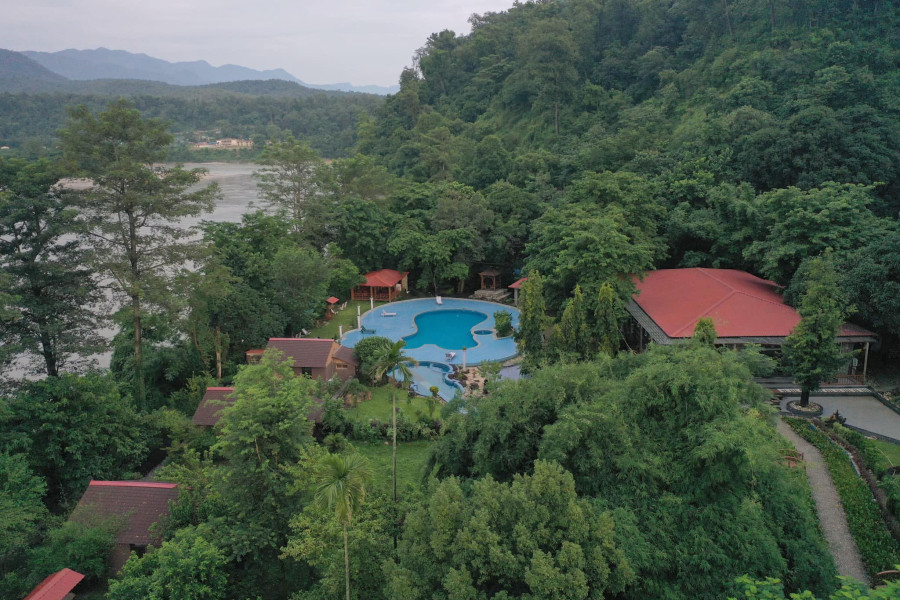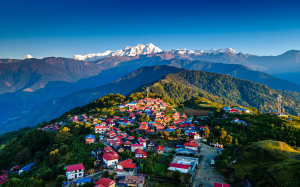Money
Trishuli riverbanks see hotel-resort boom
Investors are looking away from Sauraha, the tourism hub abutting the Chitwan National Park.
Ramesh Kumar Paudel
The opening of tourist resorts along the banks of Trishuli River in Bharatpur Metropolitan City has grown significantly in recent years, attracting numerous investors.
Until a few years ago, tourism activity along the Narayani and Trishuli riverbanks was almost nonexistent, with most hotels concentrated along the Rapti river near the Chitwan National Park.
Notably, no large hotels or resorts were on the Chitwan side of the Narayani river.
This trend is beginning to change.
In April last year, a tourist resort commenced operations in Bhateri along the Narayangadh-Muglin road. This resort is uniquely positioned with a lush forest to the west and the Trisuli river to the north.
A few kilometres from Bhateri, the Presidential Hotel has been operating for 12 years at Jugedi, on the riverbank.
Jugedi is also home to Ashoka Hotel, while the Thimura Resort operates on a Trishuli bank west of Bhateri.
Sauraha, located near the Chitwan Park, has long been the main hub of tourism in the region.
Known for its proximity to the park and its rich wildlife, including rhinos, tigers, and elephants, Sauraha draws tourists from all over the world. Over the years, it has developed into a bustling tourist destination working in tandem with numerous hotels, resorts, restaurants, and safari services.
However, the increasing popularity of Sauraha is not without challenges. The area has become overcrowded. This saturation has prompted some investors to seek quieter alternatives.
In the new destination, hotels and resorts are not limited to riverbanks; they are also being established in the hilly areas of south Bharatpur, accessible via the Narayangadh-Muglin highway.
Kabilash Resort is one such establishment in this region. Additionally, Jugedi market hosts several hotels catering primarily to highway travellers.
Recently, Thimura, Bhateri, and Jugedi have emerged as new hubs for tourist accommodations.
“A forest nearby and a beautiful view of the Trisuli riverbank. To the west, one can see seven layers of hills. Recognising the tourism potential, we started our business here,” said Kalyan Joshi, director of a resort built by River Bank Park and Resort in Bhateri.
The resort’s management is handled by an Indian company, Regenta Resort and Spa.
The resort, developed with an investment of Rs600 million from 50 small investors, spans five bighas of land. It features two suites with attached swimming pools and 102 rooms.
“Tourists who appreciate peaceful places and natural views come here,” Joshi stated. Since the Indian company took over management, the number of tourists has increased. Groups from India frequently visit the resort for dealer meetings.
Prakash Dhoj Adhikari, director of the Presidential Hotel, shared that he opened the hotel 12 years ago with an investment of Rs20 million.
“Initially, the business was not as successful as expected. However, the situation has improved recently,” he said. Adhikari financed the hotel by taking a loan of Rs160 million, encouraged by the area’s tourism potential.
Dr Pramod Lamichhane, a medical professional, has been operating Thimura Resort for the past year and a half, with an investment of Rs300 million.
“I lack experience in the hotel business, and the country’s weak economic situation has also affected the business. The results do not meet my expectations,” he said.
Many of these resorts are located near the Barandabhar forest area, which serves as a wildlife corridor connecting the Chure range with Chitwan National Park and the Mahabharat Hills. This proximity allows for wildlife sightings, including of rhinos and tigers.
Dr Lamichhane recalled an incident when a rhino approached the gate of Thimura Resort during its construction.
According to tourism entrepreneurs, the Barandabhar forest area also includes the Satanchuli and Jaladevi community forests, which offer jeep safaris and trekking opportunities.
“The tourism potential here needs to be explored. Jungle safaris, similar to those offered in national parks, can be developed,” Joshi said.
“Additionally, this area could be promoted as a wedding destination for Indian tourists from bordering areas.”
However, Joshi emphasised that certain challenges must be addressed to enhance the region’s tourism prospects.
“Security checks at the border for Indian vehicles carrying tourists should be streamlined as the current process is cumbersome. Flight service also needs improvement,” he added.
Nepal’s hospitality industry, mainly food and accommodation, generates more than Rs326 billion annually, according to a new survey report.
The comprehensive National Hotel and Restaurants Survey by the National Statistics Office shows there are 142,223 establishments—hotels, lodges, resorts, homestays, guest houses, hostels, restaurants and party venues—across the country.
The input of these establishments—hotel rooms, furniture, food, and staff salaries, amounts to Rs216.73 billion. They generate Rs109.27 billion in gross annual income.




 26.12°C Kathmandu
26.12°C Kathmandu1.jpg)














